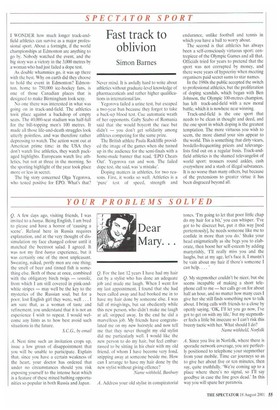Fast track to oblivion
Simon Barnes
I WONDER how much longer track-andfield athletics can survive as a major professional sport. About a fortnight, if the world championships at Edmonton are anything to go by. Nobody watched the event, and the big story was a victory in the 3,000 metres by a woman who had just failed a dope test.
As double whammies go, it was up there with the best. Why on earth did they choose to hold the event in Edmonton? Edmonton, home to 750,000 ice-hockey fans, is one of those Canadian places that is designed to make Birmingham look sexy.
No one there was interested in what was going on in track-and-field. The athletics took place against a backdrop of empty seats. The 40,000-seat stadium was half-full for the bill-topping men's 100 metres, It made all those life-and-death struggles look utterly pointless, and was therefore rather depressing to watch. The action went out at American prime time: in the USA they don't watch live athletics, they watch packaged highlights. Europeans watch live athletics, but not at three in the morning. So the sporting highlight of the year took place more or less in secret.
The big story concerned Olga Yegorova, who tested positive for EPO. What's that? Never mind. It is awfully hard to write about athletics without graduate-level knowledge of pharmaceuticals and rather higher qualifications in international law.
Yegorova failed a urine test, but escaped a two-year ban because they forgot to take a back-up blood test. Cue automatic wrath of her opponents. Gaby Szabo of Romania said that she would boycott the race but didn't — you don't get solidarity among athletes competing for the same prize.
The British athlete Paula Radcliffe provided the image of the games when she turned up in the audience for the semi-finals with a home-made banner that read, 'EPO Cheats Out'. Yegorova ran and won. The failed dope test, she said, was 'a mistake'.
Doping matters in athletics, for two reasons. First, it works so well. Athletics is a 'pure test of speed, strength and endurance, unlike football and tennis in which you have a ball to worry about.
The second is that athletics has always been a self-consciously virtuous sport: centrepiece of the Olympic Games and all that. Officials tried for years to pretend that the sport was not corrupted by money, and there were years of hypocrisy when meeting organisers paid secret sums to star names.
In the 1980s the public accepted the switch to professional athletics, but the proliferation of doping scandals, which began with Ben Johnson, the Olympic 100-metres champion, has left track-and-field with a new moral battle, which it is nowhere near winning.
Track-and-field is the one sport that needs to be clean in thought and deed, and the one sport in which doping is the greatest temptation. The more virtuous you wish to seem, the more dismal your sins appear to the world. This is something that dirty vicars, bordello-frequenting priests and televangelists find out on a regular basis. Track-andfield athletics is the shamed televangelist of world sport: trousers round ankles, cash everywhere and a stash of illegal substances. It is no worse than many others, but because of the pretensions to greater virtue it has been disgraced beyond all.


























































 Previous page
Previous page